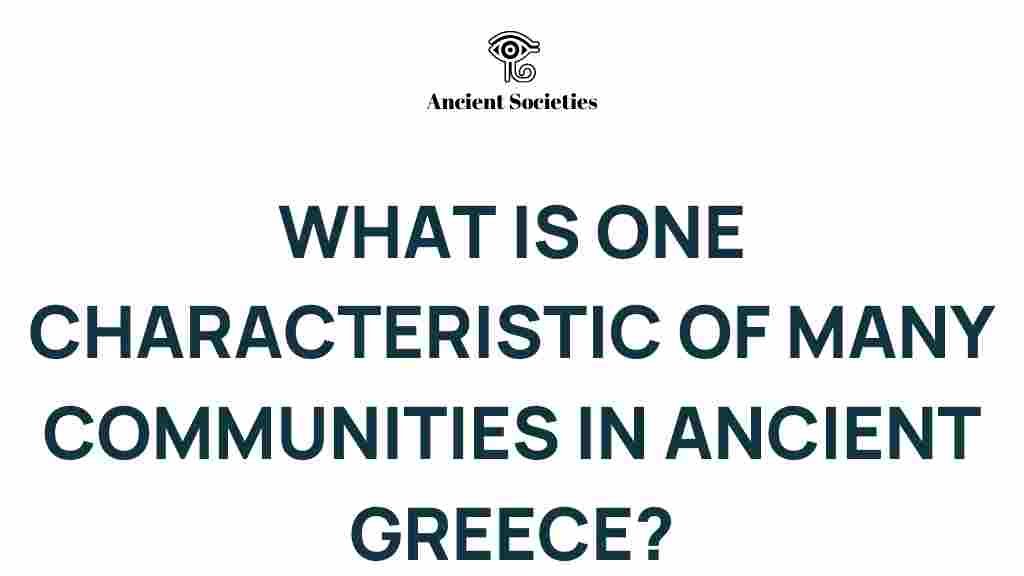Unveiling the Ties That Bound Ancient Greek Communities
Ancient Greece is often celebrated as the cradle of Western civilization, a place where democracy, culture, politics, and philosophy flourished. The ancient Greek communities were not just a collection of city-states; they represented a rich tapestry of society that was deeply interconnected through geography and shared values. Understanding these ties provides insight into how ancient Greece shaped the modern world.
The Foundation of Ancient Greek Communities
The foundation of ancient Greek communities was characterized by several key elements that fostered unity among its people:
- Geography: The mountainous terrain and the sea created natural boundaries, leading to the development of independent city-states or poleis, such as Athens, Sparta, and Corinth.
- Culture: Despite their independence, these communities shared a common language, religious beliefs, and customs that fostered a sense of belonging.
- Politics: The political systems varied widely among city-states, yet they often engaged in alliances and conflicts that shaped their interrelations.
- Democracy: Particularly in Athens, the concept of democracy emerged, allowing citizens to participate in governance, which strengthened communal bonds.
The Role of Geography in Shaping Communities
The geography of ancient Greece played a crucial role in the development of its communities. The mountains and islands created natural barriers, leading to the formation of distinct city-states. Each city-state developed its own identity, yet they were united by common language and culture.
Key geographical features included:
- Mountains: These isolated communities, fostering a sense of independence and local governance.
- Seas: The Aegean, Ionian, and Mediterranean Seas facilitated trade and cultural exchange, connecting diverse communities.
- Fertile Lands: Valleys and plains supported agriculture, which was vital for sustaining large populations.
Democracy: The Heart of Ancient Greek Society
Democracy in ancient Greece is one of its most enduring legacies. The Athenian model of democracy allowed citizens to participate directly in political decision-making, which was revolutionary at the time. This system fostered a sense of unity and engagement among the populace.
The key features of Athenian democracy included:
- Citizenship: Only free males born to Athenian parents had the right to vote and participate in the Assembly.
- Direct Participation: Citizens could speak and vote on legislation, influencing the direction of their community.
- Judicial System: The courts were open to citizens, allowing them to participate in legal proceedings.
Culture as a Unifying Force
Culture was a powerful unifying force in ancient Greece. Shared religious beliefs, artistic expressions, and common festivals brought communities together, transcending political boundaries.
Notable cultural aspects included:
- Religion: Worship of gods like Zeus, Athena, and Apollo created a shared spiritual framework.
- Theater: Festivals such as Dionysia celebrated dramatic arts, showcasing the talents of playwrights like Sophocles and Euripides.
- Philosophy: Thinkers like Socrates, Plato, and Aristotle explored concepts of ethics, politics, and knowledge, influencing both individual and communal identity.
Politics: Alliances and Conflicts
The political landscape of ancient Greece was marked by both alliances and conflicts. City-states frequently engaged in warfare, but they also formed alliances for mutual benefit.
Key political dynamics included:
- Peloponnesian War: A significant conflict between Athens and Sparta that showcased the rivalry and differing political systems.
- Delian League: An alliance led by Athens that provided military support against external threats.
- Spartan Hegemony: After the Peloponnesian War, Sparta dominated Greek politics, altering the balance of power.
Philosophy: The Search for Unity
Philosophy in ancient Greece was not only an intellectual pursuit but also a means to understand and unify the community. Philosophers sought to explore the nature of existence, ethics, and the ideal society.
Key philosophical contributions included:
- Ethics: Philosophers like Aristotle emphasized the importance of virtue and community well-being.
- Political Philosophy: Plato’s “Republic” explored the nature of justice and the ideal state, influencing future political thought.
- Rhetoric: The art of persuasion was vital in democratic Athens, where public speaking shaped political discourse.
Unity in Diversity: The Paradox of Ancient Greece
While ancient Greece was characterized by a multitude of independent city-states, it was also marked by a profound sense of unity. This paradox is evident in various aspects of Greek life:
- Shared Language: The Greek language was a common thread that linked the diverse communities.
- Common Festivals: Events like the Olympic Games celebrated athletic prowess and fostered a sense of solidarity.
- Artistic Expression: Shared artistic styles and themes reflected common values and beliefs, despite regional variations.
Challenges to Community and Unity
Despite the strong ties that bound ancient Greek communities, challenges to unity were prevalent:
- Political Turmoil: Internal strife and power struggles often led to instability.
- War: The frequent conflicts between city-states sometimes undermined communal bonds.
- Geographical Isolation: The rugged terrain could isolate communities, leading to cultural and political fragmentation.
Conclusion: The Enduring Legacy of Ancient Greek Communities
Ancient Greece, with its rich tapestry of community, democracy, culture, politics, society, and philosophy, laid the foundation for many aspects of modern civilization. The ties that bound these communities—shaped by geography, shared beliefs, and collective experiences—created a legacy that continues to influence contemporary society.
Understanding the complexities of ancient Greek unity and diversity offers valuable insights into the nature of community itself. As we reflect on these ancient ties, we can appreciate the ongoing relevance of their ideas and values in our own lives.
For further reading on the influence of ancient Greek philosophy on modern thought, check out this external link.
If you’re interested in exploring more about the cultural practices of ancient Greece, feel free to visit this internal link.
This article is in the category History and created by AncientSocieties Team
